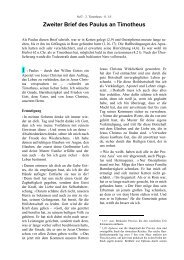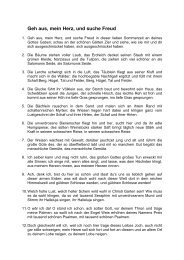You also want an ePaper? Increase the reach of your titles
YUMPU automatically turns print PDFs into web optimized ePapers that Google loves.
The fact that Archimedes had hands has never<br />
been stored anywhere in our brain, but we can<br />
immediately answer this question in the affirmative.<br />
We deduce that if he did not have hands,<br />
this fact would have been common knowledge.<br />
In regard to the second question, there may be<br />
many unknown men involved in the Boer War,<br />
but from the fact that the well-known actor Harrison<br />
Ford was born well after it ended, we can<br />
deduce that he definitely did not take part in it.<br />
And what about Johann Sebastian Bach’s (1685 –<br />
1750) telephone number? A computer would<br />
search through long lists of phone numbers, and<br />
then report that this composer either did not<br />
have a telephone, or that his name had not yet<br />
been entered. But we know when the telephone<br />
was invented, so we can quickly conclude that he<br />
could have had neither telephone nor phone<br />
number.<br />
Interpretation instead of mere data acquisition:<br />
<strong>Our</strong> <strong>sense</strong>s carry a million times more<br />
information to the brain than it is able to consciously<br />
process. And the brain does not merely<br />
register the observed realities around us like a<br />
camera or a tape recorder. <strong>Our</strong> brain reduces the<br />
flood of external data signals, simultaneously<br />
interpreting them and constructing a very personal<br />
inner world. This internally created reality<br />
is generally quite distinct from the outside world.<br />
A red rose is actually a physical structure which<br />
reflects light of a specific wavelength. Only in our<br />
brain is there such a thing as the colour red,<br />
along with the knowledge that this structure is<br />
a flower. <strong>Our</strong> brain compares these signals from<br />
outside with what it has already stored about<br />
roses previously seen. At the same time, memories<br />
of associated events and emotions are<br />
awakened. <strong>Our</strong> nerve cells not only produce an<br />
image of a rose, they evaluate it as well. An image<br />
of a red rose can cause us to recall its fragrance,<br />
and perhaps also some tender memories of a<br />
great love. All these things happen without any<br />
conscious involvement. The American neurophysiologist,<br />
Benjamin Libet, discovered that our<br />
consciousness lags about half a second behind<br />
the activities of the brain. By the time we are<br />
conscious of making a decision about something,<br />
our brain has long since analysed and evaluated<br />
88
















